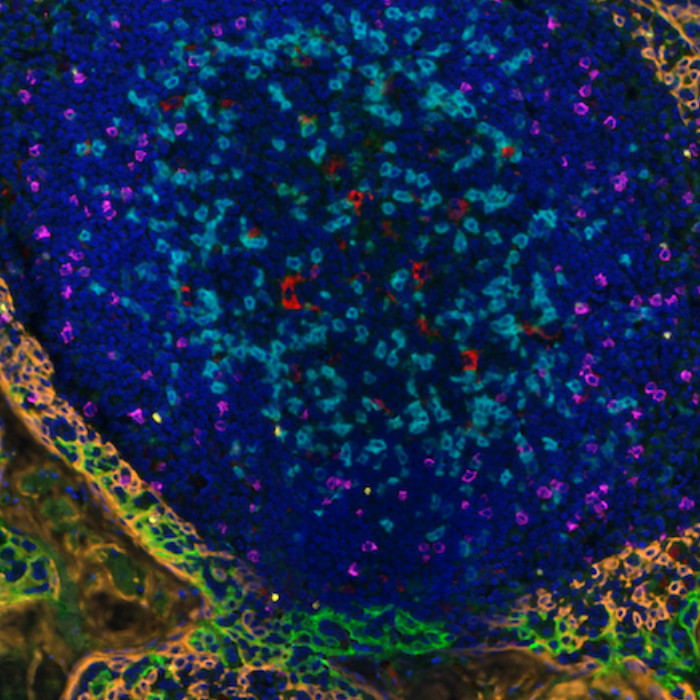news
Immuno-Oncology Grant Program Winners
Date

About the Grant Program
The Lunaphore Immuno-Oncology Grant Program has been designed with the intention of helping in the research of immuno-oncology by providing innovative instruments based on a microfluidic technology to perform mIF staining.
Among other prizes, the Immuno-Oncology Grant Program featured the unique opportunity to win a free LabSat® Research or COMET™ Instrument. For more information about the Program, please visit the dedicated page.
Grant Program Winners
The submission is now closed. Lunaphore would like to thank all the applicants for the strong interest in the grant and the numerous excellent-quality applications received.
After carefully reviewing all the applications received, we have selected the winners of the Lunaphore Immuno-Oncology Grant Program.
LabSat® Research Immuno-Oncology Grant
1st PRIZE WINNER:
Dr. Arman Rahman – Conway Institute, University College Dublin
“Exploration of the Interplay between Master Transcriptional Regulators and Immune Cells within the Tumour Microenvironment of Breast Cancer AND Comparison of subcutaneous adipose tissue (SAT) inflammatory profiles in individuals with and without COVID-19 infection.”
Project description:
Precision Oncology Ireland (POI) is a consortium of 5 Irish Universities, 6 Irish cancer research charities, and 8 companies aiming to develop new diagnostics and therapeutics for personalised cancer treatment. The POI Tissue Imaging Platform provides state-of-the-art automated immunohistochemistry and digital pathology services for high-throughput biomarker validation to all consortium members and external collaborators. Two ongoing funded programs include characterisation of immune and non-immune markers in (1) breast cancer tissue and (2) subcutaneous adipose tissue (SAT) in individuals with COVID-19 infection using fluorescence multiplexing. The LabSat® Research system, which offers ultra-rapid turnover time for multiplex staining, will enhance the research output of the POI Tissue Imaging Platform significantly.
2nd PRIZE WINNER:
Dr. Nicolas van Baren – de Duve Institute, UCLouvain
“Restoring anti-tumour immunity in endometrial cancer by shutting down COX-2-mediated constitutive IDO1 expression with celecoxib”
Project description:
Indoleamine 2,3-dioxygenase 1 (IDO1) protects tumours from T-lymphocyte attack by depleting surrounding tryptophan. Its tumoural expression is induced by cyclooxygenase-2 (COX-2) and autocrine prostaglandin-E2, and can be blocked by celecoxib, a selective COX-2 inhibitor. We have launched a proof-of-principle clinical trial to investigate the effect of celecoxib on tumoural IDO1 expression and nature, abundance, distribution and phenotype of tumour-infiltrating T cells. Patients with newly diagnosed endometrial carcinoma will receive celecoxib before tumour surgery. FFPE tumour sections from pre-treatment biopsy and surgical specimen will be stained by multiplexed immunofluorescence (pan-cytokeratin, IDO1, CD3 and CD8 markers) and quantified by computerized image analysis to investigate the in vivo effects of COX-2 inhibition. The LabSat Research instrument will help us achieve the high reproducibility, high quality and gain of time required for this study.
COMET™ Immuno-Oncology Grant
1st PRIZE WINNER:
Prof. Johann de Bono – Institute of Cancer Research and Royal Marsden Hospital
“Targeting adenosinergic signalling in lethal prostate cancers.”
Project description:
Prostate cancer is a leading cause of male cancer mortality. Tremendous advances in cancer immunotherapies have had minimal impact on prostate cancer management likely due to potent immunosuppressive barriers that are operative. The Cancer Biomarkers Group led by Professor Johann de Bono at the Institute of Cancer Research (United Kingdom) will utilize the COMETTM platform to perform hyper-plex immunofluorescence on human prostate tumour biopsies to dissect complex tumour-immune interactions that lead to immunoresistance. We believe this technology will provide insights into prostate cancer biology that can be rapidly translated into precision immunotherapies that will improve the outcomes of patients with lethal prostate cancers.
2nd PRIZE WINNER:
Dr. Adeeb Rahman – Mount Sinai School of Medicine
“Enabling High Dimensional Spatial Functional Genomics via the COMET Platform.”
Project description:
We have recently established a novel technology platform, which utilizes protein-based barcodes (Pro-Codes) to enable 100s of genetic perturbations to be detected in parallel in tissues and tumors. This project aims to adapt this technology to the COMET platform to establish an integrated workflow to comprehensively analyze the impact of genetic perturbations on cell phenotypes and tissue architecture in the tumor microenvironment.
Do you want to know more?
Click on the button below to discuss with our representatives.